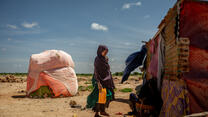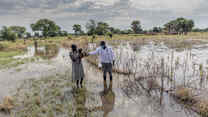In flood-prone communities in Northeast Nigeria, we used a randomized evaluation to measure the impacts of providing cash transfers to households before the onset of a shock (“anticipatory cash”) compared to the standard practice of providing cash transfers after a shock occurs.
Results indicate that providing anticipatory cash to households in flood-prone areas reduced negative coping strategies, increased pre-emptive climate adaptive actions, and enhanced investment in productive assets compared to households that received cash after peak flooding occurred.
The findings suggest that large, one-time anticipatory cash transfers can build households’ climate- adaptive and resilience capacity, making them a promising intervention to reduce household vulnerability to future climate shocks.



